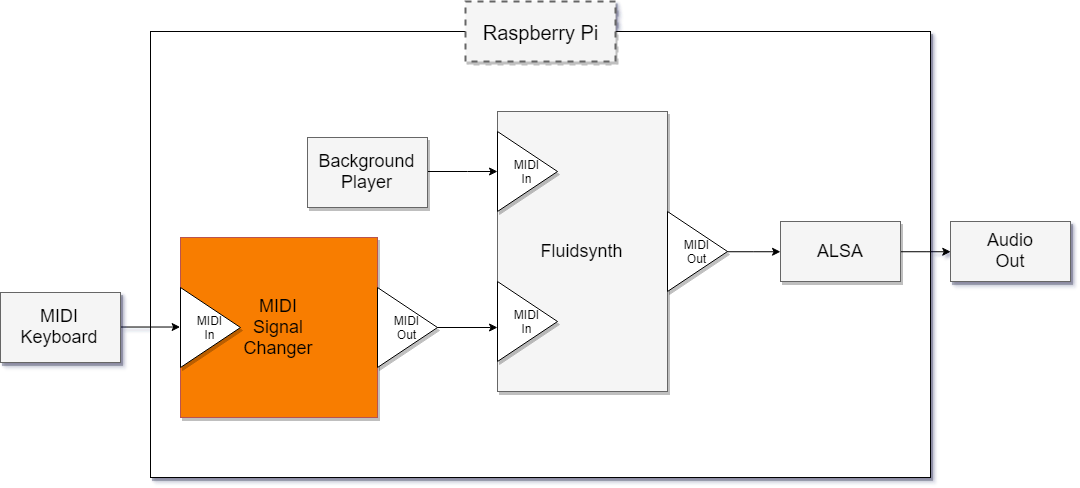この記事は Raspberry PiとMIDIインターフェースでデバイス開発をする のシリーズ記事です。
シリーズ目次
- Raspberry PiとMIDIインターフェースでデバイス開発をする
- RtMidiライブラリを使って、MIDIインターフェースを作成する
- SMF (Standard Midi Format)を解析し、MIDIインターフェースに流し込む(プロトタイプ編)
- (作成中)SMF (Standard Midi Format)を解析し、MIDIインターフェースに流し込む(クラス編)
今回はMIDIインターフェースエミュレータを作り、FluidSynthを経由して音を出します。
第1回で記述の通り言語はC++でRtMidiライブラリを使います。
Midiインターフェースは、アウトプット用、インプット用(その両用)の種類があり、OSに認識されているMidiインターフェースは aconnect -l で一覧できます。
> aconnect -l
client 0: 'System' [type=kernel]
0 'Timer '
1 'Announce '
client 14: 'Midi Through' [type=kernel]
0 'Midi Through Port-0'
Midiインターフェースを作成し、指定された名前を含むインターフェースに接続するクラスを作成します。
midi.hpp
# include <iostream>
# include "RtMidi.h"
enum struct MidiDirection {
IN,
OUT,
};
class MidiInterface {
private:
const char * name;
public:
MidiInterface(const char * interfaceName);
RtMidi * connect(std::string target, MidiDirection direction);
};
midi.cpp
# include "midi.hpp"
MidiInterface::MidiInterface(const char * interfaceName) {
name = interfaceName;
}
RtMidi * MidiInterface::connect(std::string target, MidiDirection direction) {
char clientName[256] = "";
sprintf(clientName, "%s Midi %s Client", name, direction == MidiDirection::IN ? "Input" : "Output");
RtMidi * midi = direction == MidiDirection::IN ?
(RtMidi *)new RtMidiIn (RtMidi::UNSPECIFIED, clientName) :
(RtMidi *)new RtMidiOut(RtMidi::UNSPECIFIED, clientName);
unsigned int portCount = midi->getPortCount();
for (unsigned int i=0; i<portCount; i++) {
std::string portName = midi->getPortName(i).c_str();
std::string::size_type index = portName.find(target, 0);
if (index != std::string::npos) {
char portName[256] = "";
sprintf(portName, "%s Midi %s Port", name, direction == MidiDirection::IN ? "Input" : "Output");
midi->openPort(i, portName);
return midi;
}
}
return NULL;
}
Midiインターフェース同士の接続状況も aconnect -l コマンドで調べることができます。
create_midi_interface.cpp
# include <iostream>
# include "midi.hpp"
int main () {
MidiInterface * p = new MidiInterface("foobar");
p->connect("Midi Through", MidiDirection::OUT);
while (true) std::cin.getc();
exit(0);
}
$ aconnect -l
client 0: 'System' [type=kernel]
0 'Timer '
1 'Announce '
client 14: 'Midi Through' [type=kernel]
0 'Midi Through Port-0'
$ ./create_midi_interface.o &
$ aconnect -l
client 0: 'System' [type=kernel]
0 'Timer '
1 'Announce '
client 14: 'Midi Through' [type=kernel]
0 'Midi Through Port-0'
Connected From: 128:0[real:0]
client 128: 'foobar Midi Output Client' [type=user,pid=1528]
0 'foobar Midi Output Port'
Connecting To: 14:0[real:0]
新しく foobar Midi Output Client の foobar Midi Output Portが作られポート14:0(Midi Through)と接続されているのがわかります。
解説
特になし
| 前 | 次 |
|---|---|
| Raspberry PiとMIDIインターフェースでデバイス開発をする | SMF (Standard Midi Format)を解析し、MIDIインターフェースに流し込む |
